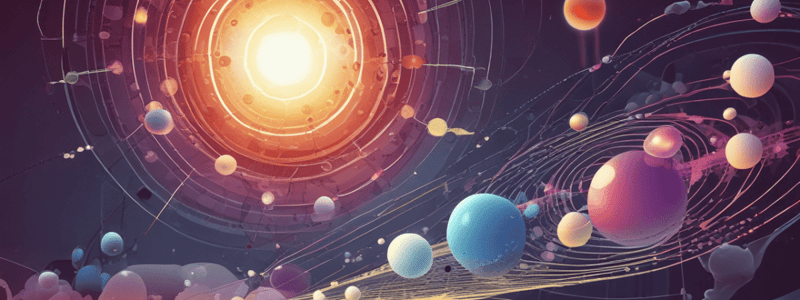Podcast
Questions and Answers
Particles moving slower result in a higher temperature.
Particles moving slower result in a higher temperature.
False (B)
Cooling a substance means energy is transferred from the substance.
Cooling a substance means energy is transferred from the substance.
True (A)
When a substance is warmed, the atoms/molecules lose energy and move slower.
When a substance is warmed, the atoms/molecules lose energy and move slower.
False (B)
Atoms/molecules themselves expand or shrink when a substance is cooled.
Atoms/molecules themselves expand or shrink when a substance is cooled.
Particles in a gas state are closely packed with strong attractive forces between them.
Particles in a gas state are closely packed with strong attractive forces between them.
Sublimation is the process where a solid transitions directly to the gas phase.
Sublimation is the process where a solid transitions directly to the gas phase.
Vaporization requires the addition of both the heat of fusion and the heat of condensation.
Vaporization requires the addition of both the heat of fusion and the heat of condensation.
As temperature increases in a gas, the overall kinetic energy of its particles decreases.
As temperature increases in a gas, the overall kinetic energy of its particles decreases.
When a substance loses energy, it undergoes a phase change from a gas to a plasma.
When a substance loses energy, it undergoes a phase change from a gas to a plasma.
What happens to the speed of atoms/molecules when energy is transferred to a substance?
What happens to the speed of atoms/molecules when energy is transferred to a substance?
How does the volume of a substance change when the atoms/molecules move faster?
How does the volume of a substance change when the atoms/molecules move faster?
What is the relationship between temperature and the average speed of atoms/molecules?
What is the relationship between temperature and the average speed of atoms/molecules?
If a substance is cooled, what happens to the collisions between atoms/molecules?
If a substance is cooled, what happens to the collisions between atoms/molecules?
What occurs to the volume of a substance when it is cooled?
What occurs to the volume of a substance when it is cooled?
When a substance loses energy, what happens to the strength of collisions between its atoms/molecules?
When a substance loses energy, what happens to the strength of collisions between its atoms/molecules?
Flashcards are hidden until you start studying
Study Notes
Energy Transfer and Temperature
- Heating a substance results in energy gain, causing atoms/molecules to move faster, leading to a higher temperature.
- Cooling a substance results in energy loss, causing atoms/molecules to move slower, leading to a lower temperature.
- Temperature is a measurement of the average speed of atoms/molecules.
States of Matter
Solid
- Particles are tightly packed together, with strong intermolecular forces.
- Solids have the lowest thermal energy content among the four states.
- When a solid absorbs heat, its temperature increases until it reaches its melting point, at which point it transitions to a liquid state.
- The energy required to melt a unit amount of the substance is known as the heat of fusion (∆Hfus).
Liquid
- Particles are closely packed but can still move around each other.
- Intermolecular forces in liquids are weaker than in solids but stronger than in gases.
- As a liquid gains heat, its temperature rises until it reaches the boiling point, at which point some molecules gain enough kinetic energy to pass into the gas phase.
- The energy required to evaporate a unit amount of the liquid is called the heat of vaporization (∆Hvap).
Gas
- Particles are widely scattered and have minimal attractive forces between them.
- Temperature in a gas reflects the average kinetic energy of its constituent molecules.
- A solid can transition directly to the gas phase without passing through the liquid stage, which is called sublimation.
- Sublimation requires the addition of both the heat of fusion and the heat of vaporization.
Plasma
- A collective of charged particles exhibiting unique properties.
- Formed when a gas absorbs enough energy to lose its identity.
Energy Transfers and State Changes
- Energy transfer plays a crucial role in understanding states of matter and their transitions.
- When a substance gains energy, its atoms and molecules gain kinetic energy, leading to changes in state.
- Examples of phase changes include:
- Melting: ice → water
- Vaporization: water → steam
- Sublimation: solid → gas without passing through the liquid stage
Studying That Suits You
Use AI to generate personalized quizzes and flashcards to suit your learning preferences.




